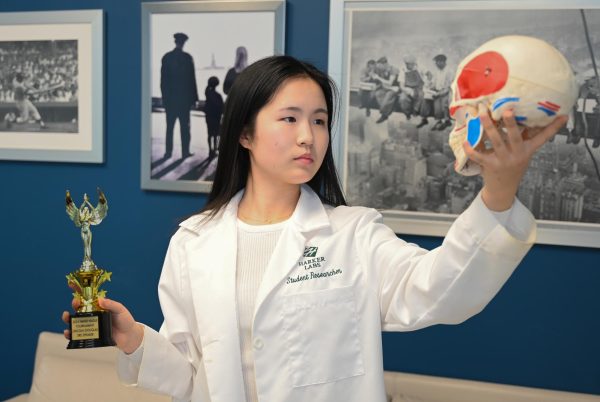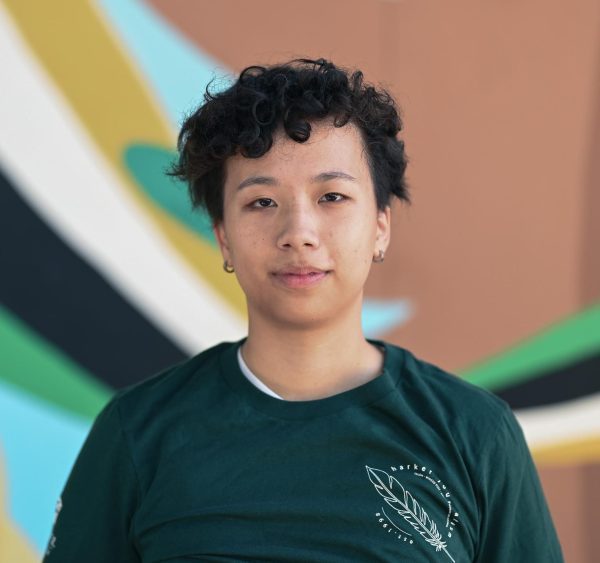
Heart racing, senior Sahngwie Yim drums her fingers along her legal binder at Golden Desert Debate Tournament at University of Nevada. The judges announce that she’s advanced to the elimination round and, suddenly, her phone buzzes with a flood of support and encouragement from her teammates back at school fills the screen. Knowing that her team is full-heartedly supporting her miles away, she feels a thrum newfound confidence, a bright smile blooming on her face as she walks towards the stage. Throughout the last four years, debate has become Sahngwie’s second home — the place where she found her voice.
Since middle school, Sahngwie has savored in the back and forth of Lincoln-Douglas debate. She especially enjoys immersing herself in the unknown depths and perspectives of each topic, reveling in critical literature and philosophy. In her most recent debate about settler-colonialism critique, Sahngwie discovered the link between medicine, pandemic declarations and colonialism.
“As a debater, you’re used to taking on new arguments and exploring different types of arguments that you might not otherwise,” Sahngwie said. “There’s no real fear of making mistakes or saying the wrong thing because you practice fully committing yourself to something that you maybe don’t agree with or have never thought about before.”
In debate, Sahngwie especially tries to focus on clearly communicating her ideas, building her confidence in presenting her research and responding to her opponents. Speech and debate coach Greg Achten notes how Sahngwie has grown into a more assertive speaker, mainly because of her constant persistence in polishing her arguments.
“My impression of her is that she is very poised and professional,” Achten said. “Sahngwie is the kind of student where if you point out a mistake, you explain it one time and she’s got it. She’s taken to heart the advice that I’ve given to her about not backing down. She has persevered in a way. That is really impressive.”
Sahngwie hopes to give a voice to her community using the advocacy skills she learned in debate. Her efforts in developing a worldly view extend to her Mitra scholar research, which explores the influence of Korea’s Confucianist and patriarchal culture on Korean family planning policy. The stories she discovered through her research were particularly personal, as she recalled the impact of the administration on her own family.
“My research puts health care and policy in the social and cultural context to gain a more comprehensive understanding of the issue and uncover what might be overlooked because people tend to only look at the concrete economic financial implications,” Sahngwie said. “Looking at the cultural aspects or historical aspects of an issue can bring out a lot of more nuanced questions and understanding.”
Using the voice she has found through debate and research, Sahngwie seeks to build community and uplift people around her. As co-president of the Women in STEM club, Sahngwie provides a space where members can explore STEM topics and extend educational opportunities to under-resourced communities. As president, she organized the annual Research Symposium last year, spearheading the organization of speakers, booths and WiSTEM members.
“WiSTEM helped me learn how to initiate programs that are impactful and make a meaningful impact rather than merely a surface level one,” Sahngwie said. “Everything that I do is purposeful and deliberate. I seek to consider the long lasting implications of the initiatives that we put on to make sure that what I do is meaningful.”
Sahngwie cares for each member of her communities, including her team members. While leading, she commits to building strong communication and bonds. Senior Sophia Zhu, who became close with Sahngwie through WiSTEM, admires her leadership and calm nature under pressure.
“She is very down to earth, and also very charismatic when she’s leading the group,” Sophia said. “When we were planning for the Research Symposium last year, it was really chaotic. There’s a gazillion things happening at once and she was able to make sure everything’s organized and stayed on top of it. She also made the process fun.Sometimes I just joke with her about the process. She’s just someone that I can be very comfortable around.”
Sahngwie connects with others not only through club efforts, but also through her personal relationships. Senior Tiana Salvi, who met Sahngwie as a frosh, describes her as strong and ambitious, someone who never backs down from a challenge. Tiana particularly admires her ability to stay true to her authentic self while striving for her goals.
“Not only is she extremely smart, she makes connections very quickly and she’s very receptive to learning new things,” Tiana said. “The medical field focuses on helping people on a day-to-day basis, and it really fits with who she is as a person. She’s always helping people out. For example, for me, it’s been listening to me talk and explaining things to me. Through WiSTEM and other activities, she’s created those communities for people at Harker to pursue their interests, and she’s made it more accessible to everyone.”
At her core, Sahngwie is motivated by humanity and bringing out qualities that bring people together. She looks to use her voice to continue building relationships within communities while also charting her own path into the unknown with confidence.
“In history, people were set on religion and personal experiences to inform decisions rather than looking at the proven,” Sahngwie said. “Looking at science and technology now, especially with artificial intelligence, human experience and input might be taken out of the equation instead. With everything I do, I hope to find a balance of personal experience and deep knowledge to not only contribute to my community, but most importantly, understand the human experience better.”


















![“[Building nerf blasters] became this outlet of creativity for me that hasn't been matched by anything else. The process [of] making a build complete to your desire is such a painstakingly difficult process, but I've had to learn from [the skills needed from] soldering to proper painting. There's so many different options for everything, if you think about it, it exists. The best part is [that] if it doesn't exist, you can build it yourself," Ishaan Parate said.](https://harkeraquila.com/wp-content/uploads/2022/08/DSC_8149-900x604.jpg)




![“When I came into high school, I was ready to be a follower. But DECA was a game changer for me. It helped me overcome my fear of public speaking, and it's played such a major role in who I've become today. To be able to successfully lead a chapter of 150 students, an officer team and be one of the upperclassmen I once really admired is something I'm [really] proud of,” Anvitha Tummala ('21) said.](https://harkeraquila.com/wp-content/uploads/2021/07/Screen-Shot-2021-07-25-at-9.50.05-AM-900x594.png)







![“I think getting up in the morning and having a sense of purpose [is exciting]. I think without a certain amount of drive, life is kind of obsolete and mundane, and I think having that every single day is what makes each day unique and kind of makes life exciting,” Neymika Jain (12) said.](https://harkeraquila.com/wp-content/uploads/2017/06/Screen-Shot-2017-06-03-at-4.54.16-PM.png)








![“My slogan is ‘slow feet, don’t eat, and I’m hungry.’ You need to run fast to get where you are–you aren't going to get those championships if you aren't fast,” Angel Cervantes (12) said. “I want to do well in school on my tests and in track and win championships for my team. I live by that, [and] I can do that anywhere: in the classroom or on the field.”](https://harkeraquila.com/wp-content/uploads/2018/06/DSC5146-900x601.jpg)
![“[Volleyball has] taught me how to fall correctly, and another thing it taught is that you don’t have to be the best at something to be good at it. If you just hit the ball in a smart way, then it still scores points and you’re good at it. You could be a background player and still make a much bigger impact on the team than you would think,” Anya Gert (’20) said.](https://harkeraquila.com/wp-content/uploads/2020/06/AnnaGert_JinTuan_HoHPhotoEdited-600x900.jpeg)

![“I'm not nearly there yet, but [my confidence has] definitely been getting better since I was pretty shy and timid coming into Harker my freshman year. I know that there's a lot of people that are really confident in what they do, and I really admire them. Everyone's so driven and that has really pushed me to kind of try to find my own place in high school and be more confident,” Alyssa Huang (’20) said.](https://harkeraquila.com/wp-content/uploads/2020/06/AlyssaHuang_EmilyChen_HoHPhoto-900x749.jpeg)



